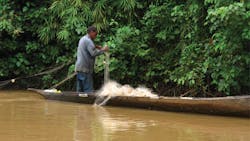Mission Zero is the name of a sustainability initiative whereby Interface, a $1 billion carpet tile producer, plans to source 100% recycled nylon by 2020 while eliminating any negative impact the company has on the environment. "Mission Zero" also could be used to describe what happens to any supplier that doesn't share Interface's goal of pushing sustainability throughout its entire supply chain, as the amount of business they do with Interface tends to drop precipitously to either nothing or next-to-nothing.
On the other hand, suppliers that commit to creating more environmentally friendly products have become key supply chain partners with Interface, and not coincidentally, have earned a substantial portion of Interface's business.
"Back in 1994, when [company founder] Ray Anderson had a vision that we would get off oil-based derivatives in the manufacture of our products, the carpet business was probably the brownest, dirtiest industry of them all," says Dan Hendrix, Interface's chairman, CEO and president. Over the past 20 years, though, Interface has reinvented itself by reducing the amount of landfill waste used in production by 94%, the amount of water used by 83%, and greenhouse gas emissions by 71%. By championing the environment, Interface also has helped rehabilitate the image of carpet manufacturers.
The company's latest green initiative is an extension of its Net-Works program into Cameroon, following a successful launch in the Philippines. Partnering with the Zoological Society of London as well as one of its major suppliers, Aquafil, Interface's Net-Works involves the recycling of worn and discarded fishing nets. In the Philippines, villagers have to date collected more than 85,000 pounds of these nets from the coastal waters. The villagers earn a paycheck, the waters are cleaned of pollution, and the nets themselves are recycled by Aquafil into nylon yarn -- the same yarn that Interface uses in the manufacture of its modular carpet products.
The Net-Works partners now plan to set up another net collection hub in the Lake Ossa region of Cameroon, which is home to West African manatees and other freshwater species of fish.
"We are challenging the status quo to reimagine our supply chain in a way that improves our ability to source recycled content, while simultaneously cleaning up oceans and lakes and lifting people from poverty," explains Nigel Stansfield, Interface's chief innovations officer. "Inclusive business is about finding ways to have a net positive impact on social and environmental issues while still minding the bottom line."
Through the Philippines project, which has helped 4,500 people in nearly 30 villages, and now the Cameroon project, Net-Works has helped to create "an economic enterprise that has three wins to it: the environment, the community and the supply chain," says Hendrix. "It's an economic model that's restorative, and it's part of what's going to happen in the world. Sustainability was popular in the 1990s and the 2000s, but social well-being and what you do for communities is the next agenda item that's emerging. Companies need to get their heads around how they actually give back to their communities."
About the Author
Dave Blanchard
Senior Director of Content
Focus: Supply Chain
Call: (941) 208-4370
Follow on Twitter @SupplyChainDave
During his career Dave Blanchard has led the editorial management of many of Endeavor Business Media's best-known brands, including IndustryWeek, EHS Today, Material Handling & Logistics, Logistics Today, Supply Chain Technology News, and Business Finance. He also serves as senior content director of the annual Safety Leadership Conference. With over 30 years of B2B media experience, Dave literally wrote the book on supply chain management, Supply Chain Management Best Practices (John Wiley & Sons, 2010), which has been translated into several languages and is currently in its second edition. He is a frequent speaker and moderator at major trade shows and conferences, and has won numerous awards for writing and editing. He is a voting member of the jury of the Logistics Hall of Fame, and is a graduate of Northern Illinois University.

